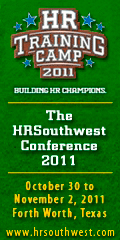HR Matters
Texas SHRM
Upcoming State Conferences: A complete listing of all state conferences by month is available at http://www.shrm.org/Conferences/StateAffilliateConferences/Pages/default.aspx
Corporate discounts Available for 2011 SHRM Annual Conference and Exposition June 26-29 in Las Vegas
The SHRM Annual Conference can be a great destination for you and your team to learn together the new ways to deliver the bottom-line results that your organization is striving for in this competitive environment. There is programming for the newest member of your team and Masters Series and Executive Programs for the leader of the team. You will hear from respected thought leaders who will broaden your teams’ talents and knowledge. While at the conference, you can spend some time as a group, digesting the information and focusing on how you can apply it to your business. Group discount pricing for corporate delegations: • 5-24 members: $975/person • 25-50 members: $925/person • 50 members: $825/person. For special rates, meeting space and more information, please contact corporatediscounts@shrm.org or visit http://annual.shrm.org/corporate-discounts.
.
Don’t forget! Deadline to Register for 2012 Best Companies to Work for in Texas is Friday, July 31
Please visit www.BestCompaniesTX.com for more information and a registration form. The 2012 Best Companies to Work for in Texas is a survey and analysis program dedicated to identifying and recognizing the best employers in Texas. You can find a description of the assessment and survey process under Assessment Process and answers to most of your questions under the FAQs on the website.
This exciting initiative is brought to you by TEXAS MONTHLY, the Texas Association of Business (TAB), the Texas State Council of the Society for Human Resource Management (TSC-SHRM) and Best Companies Group. The results of the program will be published in a special advertorial section in the February 2012 issue of TEXAS MONTHLY. Winners also will be honored at a luncheon as part of the Texas Association of Business Annual Conference in January.
Best Companies Group manages the process and will be conducting thorough assessments of all the registered companies including a survey of the Texas-based employees. While determining who makes "the list" is very exciting, the Best Companies Group Employee Feedback Report is where the real value lies. Participating companies will receive the results of the employee survey, identifying the strengths and weaknesses of their workplaces. As an added value, each company will receive employee benchmarking data, which may be used to compare oneself to the list-making companies and the overall participants.
For samples of our surveys and reports, please review the Best Companies to Work for in Texas website or click here: Survey & Reports Samples.
If you have additional questions, please email JackieM@BestCompaniesGroup.com or call
717-909-1570.
Hotel Information and Reservations:
The Westin La Cantera Resort
16641 La Cantera Pkwy.
San Antonio, Texas 78256
210-558-6500 for reservations
TAB Room Rate: Group Code: Texas Association of Business (TAB)
Reservation deadline for discounted rate: Monday, June 13, 2011
$185.00* single/double
TAB/SHRM Texas State Council Employment Relations Symposium, July 13-15 at the Westin La Cantera Resort, San Antonio, Approved for 9.5 HR Certification Institute Credit Hours (2.5 Strategic)
You are encouraged to register to attend the 2011 Texas Employment Relations Symposium on July 13-15, 2011, at the Westin La Cantera Hotel and Resort in San Antonio, Texas. The Texas Association of Business (TAB) and the Society for Human Resource Management (SHRM) Texas State Council have once again formed a partnership to bring you the highest quality human resource training in a resort setting. Attendees of the Annual Symposium receive cutting-edge labor law changes and trends that are critical to every human resource manager and business owner. Not only will you receive legal counseling from some of the top attorneys in the state, you will get practical guidance from human resource management professionals who apply the rules and regulations to their business environment every day.
Below is just a brief preview of this professional development opportunity:
• The NLRB and What Every Employer Should Know About its New Agenda
• "Want This Job? Password Please"
• "Social Media in the Workplace"
• "I Didn't Know You Couldn't Do That Any More"
• The New Boundaries of Anti-Retaliation
• Keys to Developing a Strategic Generational Diversity Workforce Plan for Your Organization
• Talent Selection & Workforce Management
• Utilizing Highly Effective Job Fit/Job Match Strategies
• Everything's a Disability - The New Regulations under the ADAAA
• FLSA Compliance and Avoiding Class Actions
• Employment Litigation Trends
• ICE Heats up on Employer I-9 Employment Verification Audits - Will Texas Follow?
• How to Handle a Scandal - When Executives Behave Badly
• Developing a Talent Management Strategy for Your Organization
• Workplace Incivility - If It's a Problem, Can a Legal Solution Be Far Behind?
The symposium opens with a welcome reception Wednesday evening, July 13, at 5:30 p.m. A Thursday luncheon, as well as continental breakfast and snack breaks on both Thursday and Friday are included with each registration. Go to http://www.txbiz.org to learn more and register for the TAB/SHRM Employment Relations Symposium. Deadline to reserve rooms at a discounted rate is June 17, 2011.
Appreciation goes to our full conference sponsors: Ogletree Deakins Attorneys at Law, Kemp Smith, Aflac, Meador Staffing Services.
Contact Rachael Small at 512-477-6721, ext. 113, or by e-mail at rsmall@txbiz.org with your questions about this exciting event. See you at the Symposium!
Hotel Information and Reservations:
The Westin La Cantera Resort
16641 La Cantera Pkwy.
San Antonio, Texas 78256
210-558-6500 for reservations
TAB Room Rate: Group Code: Texas Association of Business (TAB)
Reservation Deadline: Wednesday, July 13, 2011 - $185.00* single/double; Thursday, July 14, 2011 - $185.00* single/double; Friday, July 15, 2011 - $185.00* single/double. A limited number of rooms are available at the conference price for Friday night.
New! SHRM Launching Affiliation with Internships.com to Promote HR Internship Opportunities
In the coming weeks, you’ll hear about this exciting new venture, but we wanted our volunteer leaders to be among the first to preview this new program. SHRM and Internships.com are teaming up to provide access to HR internships for our student members. As a member benefit, students will have access to a special web portal to search for internships in the HR field. It is also free for employers to post, search and hire on Internships.com. More information will be coming soon, so watch your email. Additional details will also be available via the Student Programs webpage at www.shrm.org/students or email SHRMStudent@shrm.org.
So what can HR do to resolve this conflict when English-only rules do not apply, such as during break times and lunches, and for businesses that cannot justify such a policy? First, educate employees on discrimination laws and work to foster inclusion.
Start with presentations on national origin discrimination and show the correlation between native languages being allowed in the workplace and the law. Work to create a presentation that shows common misconceptions on both sides and engenders respect for each other. Employees should be well informed of the company’s discrimination policy, which should also include the use of languages and guidance on what would constitute discriminatory or harassing behaviors. It should be communicated to all employees that failure to abide by the company’s policy and its expectations may result in disciplinary action, including termination.
HR also must search for ways to ensure that inclusion is an integral part of the company’s culture. Providing a cohesive environment where everyone is respected and valued is vital to ensuring organizational success. Employees may find it easier to assume that others are deliberately speaking a foreign language to hide something rather than to take the time to understand another’s point of view. Conversely, always excluding employees from conversations by using another language can be unprofessional, unfair to co-workers and not in the best interests of the employer. Diversity and inclusion training should include awareness of cultural differences and the challenges non-native-English speakers may currently or once have faced, such as trying to fit into a new culture, being understood when conducting daily activities and being accepted and included at work. Employees also need to respect those fluent in more than one language. These individuals are able to speak English, but at times choose to speak to others in another common language. This is a natural way of sharing a part of their heritage while providing enjoyment in speaking a language that they both share.
Finally, the organization’s management must "walk the talk" and be ready to address situations that affect their teams or jeopardize the employer’s goals and vision for the organization.
Oh the joy of Texas summers! With balmy 104 degree days and a sun that could melt pavement, many employers are left to decide whether to crank up the A/C or relax dress code policies and risk turning up the heat with skimpier wardrobes. Most businesses have official dress codes, but often in the heat and humidity of the summer months, employees push the envelope in search of relaxed standards. Where should the line be drawn and what are the legal risks employers may face when it comes to restricting employees from wearing certain types of clothing?
If the line is crossed between office-appropriate and too-much-skin, employers need to know whether enforcement of dress codes may be unlawful. Although there are no federal laws that directly address employer dress codes, such policies cannot be used to discriminate against employees on the basis of protected traits such as gender, race, religion or disability, to name a few. But despite such protection, some employees periodically try to take advantage of their rights.
In 2007, a Costco employee was fired for consistently wearing an eyebrow piercing on the job. The employee filed a religious discrimination lawsuit claiming that he belonged to the "Church of Body Modification." Not surprisingly, Costco won the lawsuit. Another popular claim against employer dress codes focuses on gender discrimination. Although effort must be made by employers to treat men and women equally in the workplace, they are allowed to make distinctions in dress code based on gender. In 1998, a court upheld Blockbuster’s dress code that mandated male employees to cut their long hair, but did not enforce such a restriction on female employees. Even though employers rarely come out on the losing end of lawsuits stemming from dress code violations, litigation can be both costly and damaging to a company’s reputation.
Here are a few tips for employers and HR professionals to ensure that dress code standards are upheld, while employees remain comfortable and happy:
• Require employees to maintain an appropriate, well-groomed appearance.
• If you choose to allow casual business attire, provide specific guidelines for what is and is not acceptable.
• Clearly communicate dress code expectations and policies to employees.
• Consistently enforce the dress code with all employees, making exceptions only where the law requires such or there are other compelling circumstances.
• Be careful not to target female workers as compared to males, or younger employees versus older employees.
• Disciplinary action for dress code violations should be applied uniformly to all employees.
Smart employers will communicate and implement their dress code before issues arise, lest a wayward employee claims that the change of rules unfairly targeted them. When reviewing or forming a dress code, be sure it is reasonable, nondiscriminatory and founded on legitimate business needs. This way you can beat the summer heat, without getting burned by a cold employee.
Michael Abcarian is the Managing Partner of the Dallas office of Fisher & Phillips, a national labor and employment law firm. He has experience advising and defending employers in a variety of labor and employment matters. He can be reached at mabcarian@laborlawyers.com
• Major newspapers and periodicals. HR professionals can expand their knowledge base by reading national and local news. Major daily periodicals provide current information on important law changes, proposed legislation in your state, as well as issues facing local/regional employers - for example, business shutdowns - that may in turn have an effect on your own organization. Keeping on top of these issues can help you create contingency plans for your organization, as well as give you a head start on whether to make changes to current corporate policies. Consider subscribing to one or two major newspapers/periodicals or, as an alternative, dust off that library card and check out the local library.
• SHRM website. This site provides a wealth of valuable HR resources for HR professionals. Consider taking a few minutes every day to scan the Latest News section for current new items on the HR front. Also, the Templates and Tools area of the website includes HR Q&As on frequently asked HR questions and How To Guides that not only educate but also provide useful and practical information relevant to HR professional’s responsibilities on the job.
• Federal and state government websites. Many federal government websites (DOL, IRS, CMS, Treasury) as well as your state’s department of labor have sections on frequently asked questions, which HR professionals can use to educate themselves on federal and state laws and practices.
• Books on HR topics. The SHRMStore is the world’s largest HR bookstore and provides numerous learning products in a variety of formats (books, videos, software) on everything under the HR sun.
• Formal education and certification programs. Consider pursuing an advanced degree, certificate program or professional certification in human resources. Most major universities provide advanced degrees and certificates in the HR field. The HR Certification Institute provides testing to gain certification as a Professional in Human Resources (PHR®), Senior Professional in Human Resources (SPHR®), Global Professional in Human Resources (GPHR®) or California certification (PHR-CA® and SPHR-CA®). These certifications show your peers, your employees and your organization that you have mastered the core HR principles. Certification also requires continuous learning, which can motivate HR professionals to seek out continuing educational opportunities.
• Courses/seminars. SHRM and other providers offer HR-related courses and seminars on various HR topics, including information and guidance on new laws, their effect on employers and successful integration/implementation of new policies and practices to ensure legal compliance. SHRM also offers e-learning courses that provide education on HR-related issues.
• Local SHRM chapters. Local chapters are an excellent resource for networking with other HR professionals about the issues they face every day, as well as providing vendor recommendations and best practices to further expand HR knowledge/expertise.
• Volunteering. Volunteering in a professional capacity with local community groups or sitting on the board of another local organization can help build business expertise and hone leadership skills.
• Mentoring. Consider setting up a mentoring plan with another senior manager within your organization. This cannot only provide insight on other management styles/roles, but also broaden business knowledge in other areas of an organization. For example, working with a senior financial manager can provide knowledge on corporate financial practices that may be helpful in a future position.
While not an exhaustive list, these suggestions should provide you with ideas on ways to continue learning and contributing to the HR profession.
Attention Membership Directors! You spoke and we listened! After a great response to last year's Membership Summit, held with the 2010 Leadership Conference, we are offering a more robust and interactive FREE Membership Marketing Summit. The summit will be held on the Saturday before the 2011 SHRM Annual Conference and Exposition in Las Vegas, June 25, from 10 a.m. to 4 p.m. Led by SHRM's membership marketing team and marketing partners, this interactive workshop will provide:
• Information and marketing resources to help you grow SHRM membership in your chapter
• Hands-on training to develop membership marketing materials specific to your chapter
• Opportunity to network with other membership directors.
Specifically, we will share tips and best practices on how to recruit members. You won't want to miss this opportunity. Registration is separate from the conference registration. Space is limited, so sign up soon at http://shrmmembership.eventbrite.com/. Registration closes when all seats are filled. Additional information will be provided to attendees the week of June 13. To register for the 2011 SHRM Annual Conference, go to http://annual.shrm.org/. Even if you can’t attend the full conference, there are one-day registration and exhibit hall pass options available.
The SHRM Foundation awards a total of $100,000 annually in scholarships for SHRM members (http://sapphire.shrm.org/Scholarships/Default.aspx) pursuing degrees in HR-related fields or SPHR, GPHR, PHR or California certification. Members working in the media industry and pursuing a college degree are eligible to apply for a Barbara Sanchez Scholarship. In addition, SHRM professional chapters and state councils are eligible to compete for the Certification scholarship to fund programs that promote SPHR, GPHR, PHR or California certification. (Note: "SHRM members" includes professional, general or associate members. Student members, student chapters and local-only members of chapters are not eligible for this scholarship program.) All applications must be submitted online. The online application process was opened on April 1. You can save your work and then complete the process at a later date. Your application must be completed and submitted by July 15 to be considered for an award.



